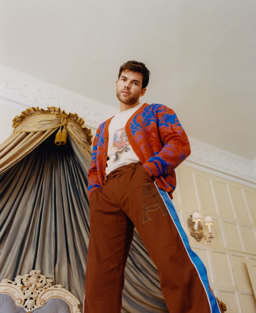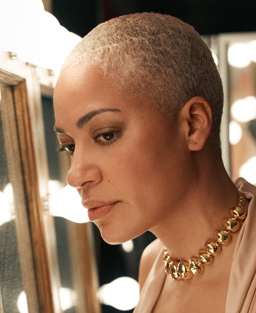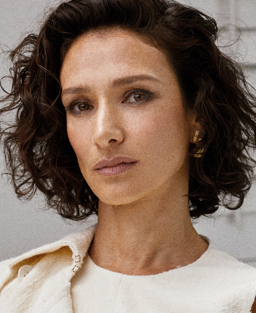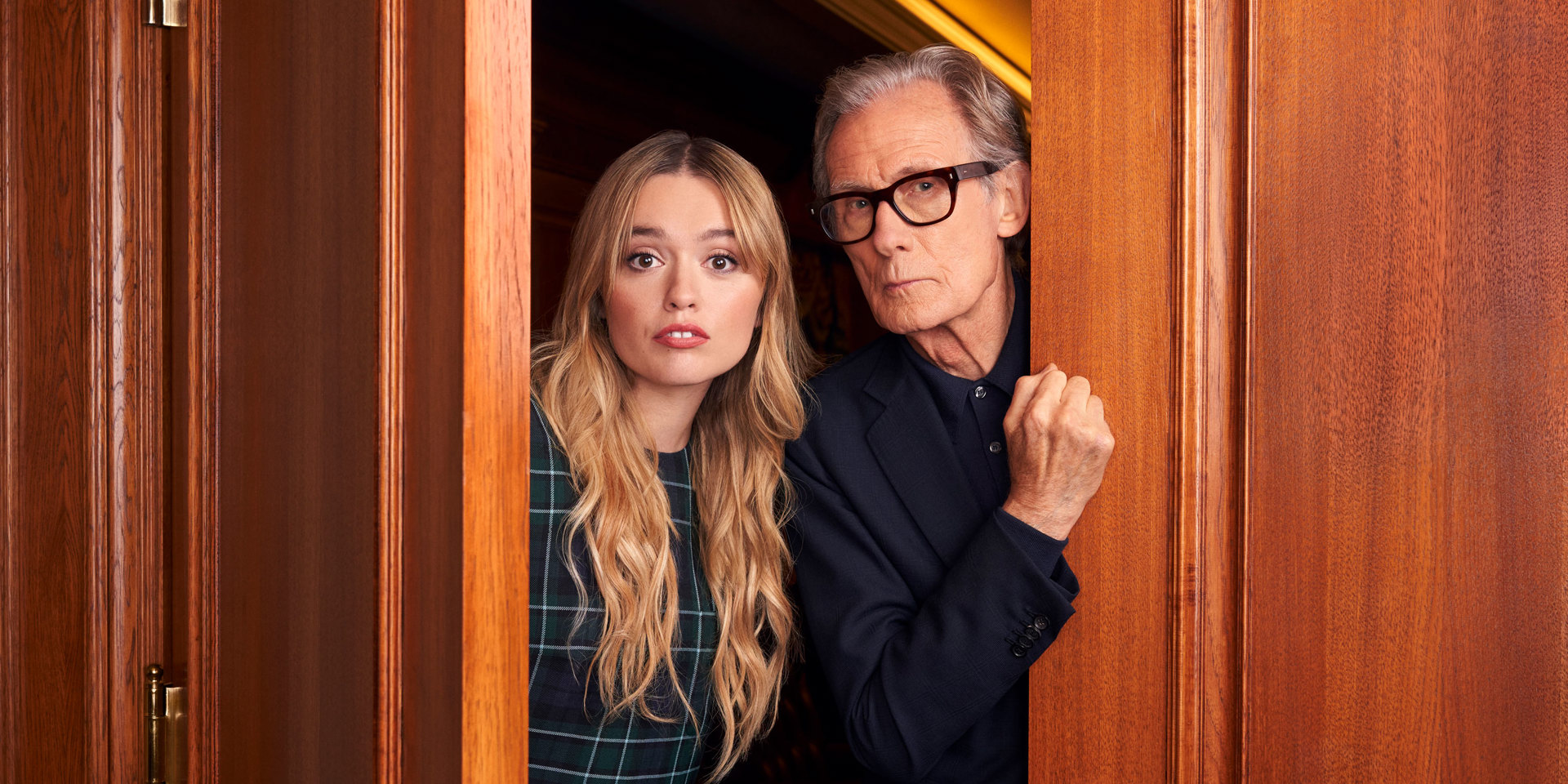

In conversation with Oscar nominee Bill Nighy and Aimee Lou Wood
One’s a familiar face and veteran screen favourite and the other is a Bafta-winning up-and-comer who we’ll be seeing a lot more of. As Bill Nighy and Aimee Lou Wood star together in the hotly tipped movie Living, we meet them to discuss life, death and where to get the best cup of coffee in London
Originally published on 01/11/2022
Words: Helen Whitaker
Photographs: Philip Cheung
Styling: Leith Clark
Bill Nighy and Aimee Lou Wood have racked up some serious air miles in service of their new movie, Living, for which Nighy is in the running for an Oscar. After film festivals in Venice and Telluride (as well as a remote appearance at Sundance), they touch down in Canada, where High Life catches up with them on the rooftop of the upscale Fairmont Royal York, located in downtown Toronto, one sunny morning in September. The temperature is in the mid-20s and energy is high. With the backdrop of the CN Tower from the 1920s-built hotel, the two actors riff off each other and change up their poses for almost every frame, showing no signs of flagging even with an afternoon of red carpets and junket interviews for the movie ahead of them.
“If I throw a shape in a photo, the odds are that it’ll be more interesting than me standing there looking embarrassed, because it is kind of embarrassing,” Nighy explains three weeks later, when we catch up at The Stafford Hotel in London. From the stream of hellos and handshakes with staff as we take our seats, it’s clear he’s a beloved regular here. Dressed smartly in his signature look of dark trousers, three-button polo shirt, and dark jacket, he seems like a man very much at ease with himself, but says he’s no more comfortable during photoshoots after five decades in show business than he was at the start of his career.
“Understandably, people think I must have got used to it, but that’s absolutely not the case,” he says, adding that he never watches his own films or reads his interviews. “I have the same response that anyone sane would have: it’s incredibly alarming and ‘Can I go home now?’”
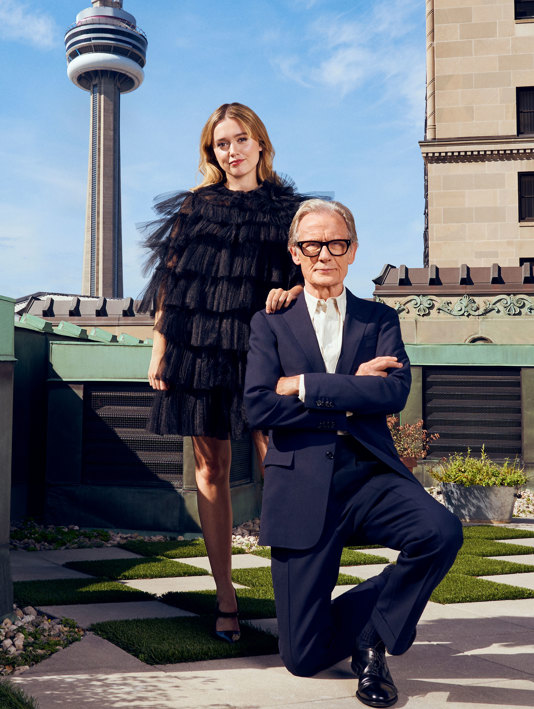

Opening image: Aimee Lou Wood wears Miu Miu plaid mini dress. Bill Nighy wears his own clothes. Left: Wood wears Huishan Zhang black tulle Cannes dress; Manolo Blahnik ‘Camparinew’ patent leather pumps. Right: Nighy wears his own clothes
A tale of old-fashioned manners
Even if it is borne of awkwardness, Nighy and Wood’s real-life camaraderie is as palpable on the High Life set as it is in Living, the film we’re here to talk about and where they play the two leads as town planning department colleagues whose biggest commitment seems to be to not getting things done.
The movie has been adapted by Nobel prize-winning author of The Remains of the Day, Kazuo Ishiguro, from Akira Kurosawa’s original 1952 Japanese film, Ikiru (To Live). With the setting transposed from Japan to 1950s London, Nighy plays buttoned-up department head Mr Williams, a lonely widower who has been propelled purely by duty for years. Wood, meanwhile, is Margaret Harris, an upbeat and ambitious young woman who is excited to fly the civil service nest for a managerial position at Lyons tearooms. At the film’s start, the two have little to do with each other. The social mores around their respective ages, sexes and workplace hierarchy see to that, as does Williams’ reluctance to engage in anything other than superficialities. But when he receives a terminal cancer diagnosis, he galvanises, committing to getting a children’s playground built on a former WWII bomb site – a project that has been shelved countless times by impenetrable council bureaucracy – before he dies. In the process, Miss Harris becomes Mr Williams’ confidante, and the only person he trusts with the truth of his condition.
While it’s not the high-octane, world-saving heroism cinema-goers have become accustomed to these days, it’s a tribute to both actors’ performances that you’re no less invested in the outcome than if Mr Williams was trying to save the Earth from an on-course meteor strike. Understated and nuanced, Nighy expresses a lot with small gestures, bringing the emotionally repressed civil servant to life.
“Acting like someone who does not allow himself to express great emotion in any flamboyant way is fascinating, and I kind of love it because it’s funny,” says Nighy, sipping a soda water and lime. “It’s so crazy the way that people used to be – well, they still are – but it was more extreme in that period, where you apologise for being too much trouble: ‘I’m terribly sorry, but I’m dying.’”
If it sounds bleak, it shouldn’t. Orbiting around the theme of what constitutes a life well-lived, the beauty of the film is that there’s also levity, mainly generated by the period’s strict social codes. Miss Harris and Mr Williams’ friendship is purely platonic, yet there’s a huge scandal when they’re seen together in public. The courage Mr Williams summons to speak up to his boss about the playground is huge in terms of breaking with etiquette, and the endless, achingly courteous dead ends hit by the mothers petitioning for it are all cause for laughter.
The laughs, Nighy reasons, are only fair. “Otherwise, it’s bad manners to ask people to sit in the dark for two hours,” he says, applying his own moral code to cinema-going. “I’m sure it’s not peculiar to England but, for the sake of this, that kind of Englishness is funny. These people are constrained from birth to run along certain tram tracks and never deviate and trouble anyone with their concerns.”

Aimee Lou Wood wears Miu Miu plaid mini dress. Nighy wears his own clothes
Bill Nighy in London
Trouble is one thing Bill Nighy isn’t. Quite the opposite in fact. The London-dwelling, soon-to-be 73-year-old is a man who likes to walk. He is both a relatively common and a welcome sight in the Soho/Mayfair area.
A recent tweet by a broadsheet journalist – asking, “Have you ever seen Bill Nighy out and about?” – garnered in excess of 800 replies in five days, with the vast majority of people mentioning how suave he looks as he cuts a swathe around central London. From the responses, he’s often spotted in bookshops and cafés. “I love cafés about as much as I love anything else in the world,” he tells me, before reeling off his favourites – Sunflower Kitchen on Pollen Street, Morris’s Café on Clifford Street and Benvenuti on Upper Tachbrook Street. The latter, he tells me, serves “a sensational cup of coffee”.
Despite dozens of screen credits to his name, he’s probably still best known for Love Actually, where he stole every scene as ridiculous aging rocker Billy Mack. Next year the film will be 20 years old. “I’d be there like a shot, yeah,” he says instantly, when I ask if he’d consider a sequel if it were offered. “I’d love to do it again. And I could still get into those Lycra trousers.”
However, these days, it’s one of Richard Curtis’s other films, About Time, that’s first place in the league table of roles people approach him about. “They can never remember the title, though,” he says with a laugh. “They say, ‘You know, it’s the one where you go back in time. You go in the cupboard.’ If it’s young men, they recognise me for Shaun of the Dead and, for very young children, it’s Pirates of the Caribbean. Although how anyone recognises me from that…” His face, entirely devoid of Davy Jones’ tentacles, simply looks confused.
Young men recognise me from Shaun of the Dead and very young children from Pirates of the Caribbean
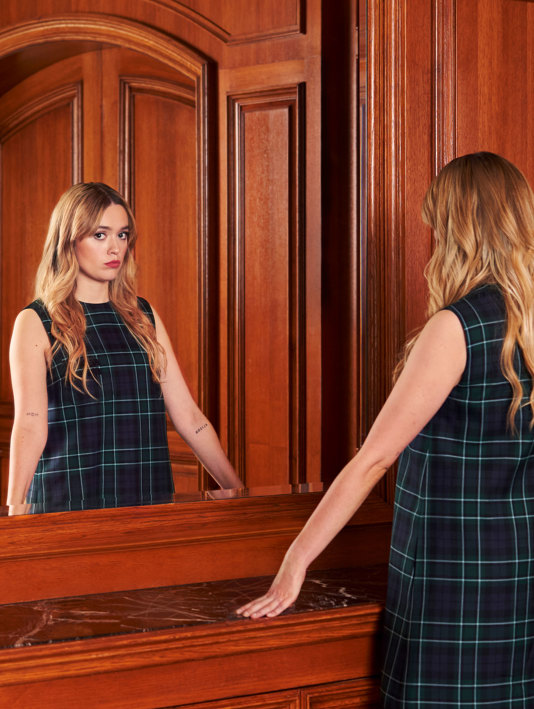

Left: Wood wears Miu Miu plaid mini dress. Right: Nighy wears his own clothes. Wood wears Huishan Zhang black tulle Cannes dress; Manolo Blahnik ‘Camparinew’ patent leather pumps
Sex education star Aimee Lou Wood
Though a few years behind Bill in terms of screen credits, his Stockport-born co-star Aimee Lou Wood is just as used to being recognised in public. After graduating from Rada, the 27-year-old actress started her career in theatre (credits include Uncle Vanya and Mary Stuart in the West End), but it was landing the role of ditsy and refreshingly honest Aimee in Netflix behemoth Sex Education that catapulted her to household name status among the show’s enormous viewing audience – season one hit 40 million streams not long after its 2019 debut. While the professional success has been enthusiastically received, how to handle the approaches in the street from strangers has been trickier to navigate. “I’ve found that quite challenging,” she tells me over the phone during a filming break from Sex Education season 4. “Especially as my character has the same name. Sometimes when someone comes over, I can see in their eye they’re expecting Aimee the character, and I’m, like, ‘I can’t give you that because, for one, she’s not me and, number two, I’m running around, I’m busy, I’m late for something.’”
If Aimee in the show was a ‘cool, aloof girl’, fans might think twice, but she’s the kind of person that the average Gen Z-er would love to have as a best friend, she acknowledges (and that’s before you throw in the fact that she has a goat for an emotional support animal).
“But I also think that for a while I was projecting a lot of that onto people,” she adds. “Lots of people who come over know I’m not that character and they just want to be nice about the show but, if you’re playing a character who’s an amazing friend, you put pressure on yourself not to disappoint anyone, so people aren’t like, ‘Aimee in the show is lovely but Aimee in real life?’” She pauses for comic effect. “‘Bloody hell!’”
After season one’s success, and an initial detonation of fame, season two was released in 2020, not long before the world went into lockdown. Season three followed in September 2021 when things were still only tentatively opening up. It’s really just this year, while travelling for Living that she’s truly experienced the international reach of the show.
“I was at the Telluride film festival in Colorado in a shop and the girls working there were like, ‘Oh my god, Sex Education!’” she says. “I was like, wait, this is actually weird now – when you’ve spent 12 hours travelling to a different place and people are still going ‘Aimee! How’s your goat?’”
Bafta-winning performances
Wood’s natural aptitude for comedy earned her a Bafta in 2021, along with another nomination in the same category in 2022 and a nomination for Bafta’s EE Rising Star Award this year. In Living, she brings wit and cheerfulness to Mr Williams’ sombre existence without tipping into sentimentality. It’s difficult to believe that this is her first substantial film role. “I did a very small part in The Electrical Life of Louis Wain,” she says. “So I had a bit of experience of being on a movie set, but this felt very different. It’s so different to TV as well.” On her Instagram page (followers count 2.3 million), she states that her heart belongs to this film, and she says Nighy, as well as director Oliver Hermanus, taught her “so much” during production of it.
“That scene we have in the pub where Mr Williams tells me that he’s dying,” she says with a gasp. “I remember leaving that day and I could not stop crying because I thought I’d witnessed something so special. Bill did a nine-page monologue and I believed every word. We’d spent the whole day on it. On TV it’s like go, go, go, so if you’ve got an emotional scene everyone tries as much as they can to give you the time and space for it, but you know you’ve also got to get through many other scenes. On a film you have time. For me, in that way it’s a bit more like theatre. I love getting to rehearse, so it felt like the perfect middle ground.”
Pre-pandemic, Wood had got into a groove of filming a season of Sex Education and following it with a stint on the stage, before returning to film the show’s next season. She had begun a well-received run as Sonya in Uncle Vanya in the West End when Covid cut it short.
“I really want to return to the theatre,” she says now. “I remember someone came into Rada for professional development – we would know him as basically a film actor – and he said, ‘Go back to the theatre when you can’. He said that he left it too long and got so used to being on a set that then the theatre felt too scary, and he got bad stage fright. I do think it’s really important for actors to do everything, to do it all.”
That, she definitely can.
Hair Janet Jackson at P1M
Makeup Caroline Levin at P1M
Grooming Nadia Altinbas at A-Frame
Creative direction Jon Wiggins
Production: Matt Richardson-Wood
With thanks to the Fairmont Royal York, Toronto



